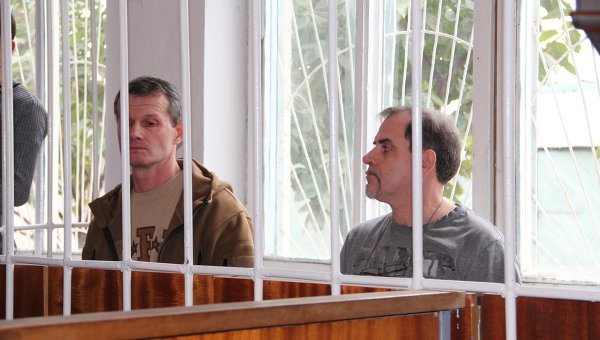
Tajikistan Prods the Bear By Imprisoning a Russian Pilot
Publication: Eurasia Daily Monitor Volume: 8 Issue: 208
By:

Tajikistan has raised tensions with Moscow after a court in Dushanbe convicted a Russian citizen, Vladimir Sadovnichy, sentencing him to serve eight years and six months in prison for smuggling and illegally landing his aircraft on Tajikistan’s Kurgan-Tyube airport last March. While the details of his case are unavailable through reliable public sources, Dushanbe’s move to imprison a Russian citizen has provoked antagonism among political circles in Moscow. Unless Sadovnichy is paroled, Tajik labor migrants working in Russia will most likely experience the repercussions of the deteriorating relationship between Dushanbe and Moscow.
Sadovnichy argues that he had Tajikistan’s verbal permission to land his plane for refueling en route to Afghanistan and had nothing illegal onboard his aircraft and was only transporting engine parts. Although Sadovnichy might indeed have been guilty of violating Tajik law, the country’s courts most likely carried out the ruling regime’s political decision on Sadovnichy’s case. Judging by the way the Sadovnichy case was handled, the Russian pilot has become Tajik President Emomali Rakhmon’s instrument in dealing with Moscow, a policy that ignores the interests of Tajik citizens working in Russia. It is difficult to predict what exactly he wants to achieve by irritating Russia, but Rakhmon has certainly chosen a bad moment to adopt this strategy.
The incident has received widespread coverage in Russia, where nationalist movements are on the rise ahead of the parliamentary elections. A number of politicians have warned Tajikistan about possible repercussions. Russian President Dmitry Medvedev stated that the reaction to Tajikistan’s court ruling might involve “asymmetrical” methods. Valentina Matvienko, the speaker of the Russian parliament’s upper chamber, claims that the verdict in the Sadovnichy case was politically motivated. She said that Russia will continue to press the Tajik leadership to overturn the court’s decision. The Russian nationalist movement, “Motherland – the Congress of Russian Communities,” has called on the government to introduce visas, impose quotas and allow only a limited stay for Tajik migrants (www.rbk.ru, November 9). The movement also demands that Russia should suspend its military aid to Tajikistan and investigate why the Russian embassy in Dushanbe failed to protect the pilot.
The nationalist movement also describes Tajikistan’s actions as a “provocation” and an attempt to change the course of relations with Russia unilaterally and has called on the Kremlin to “take responsibility for what is happening in the country.” The movement’s requests echo Russian nationalists’ calls to create a stronger state that would protect the rights of ethnic Russians. Opposition forces have used these frustrations during a 7,000 strong rally on November 4 – Russian Unity Day. By mobilizing such a large crowd, some regime critics are trying to challenge the ruling United Russia party’s victory in December.
The Russian government’s failure to secure the release of Sadovnichy will present yet another opportunity for nationalists to challenge United Russia. Moscow’s official response was rather reserved. “The current decision does not contribute to the existing relations of cooperation and strategic partnership between the two states, it causes serious damage,” the Russian foreign ministry stated, insisting that the sentence must be reviewed (www.ria.ru, November 9).
In response to this statement, Shukhrob Sharipov the Director of Tajikistan’s Center for Strategic Studies, suggested that the Russian government has ignored problems within its own agencies (www.interfax.ru, November 9). He argued that the Russian embassy in Tajikistan continued to ignore the case until they learned about the verdict from Tajik newspapers. Indeed, Sadovnichy had spent around six months in a Tajik detention center prior to the court ruling. Aleksey Rudenko, Sadovnichy’s co-pilot and an Estonian citizen, also faces similar charges. The Estonian foreign ministry has said that it is continuing to examine possible solutions with the Tajik authorities (www.news.err.ee, November 9).
Tajikistan is one of the world’s biggest recipients of remittances compared to its state budget. In 2010, these remittances reached $2.1 billion, with most of the transfers coming from Russia (www.CentralAsiaNewsWire.com, February 1). The number of labor migrants in Russia might well reach one million. This asymmetric relationship has presented Moscow with strong leverage over Tajikistan’s regional policy. Meanwhile, hundreds of Tajik citizens (along with labor migrants from other former Soviet states) die in Russia every year, mostly due to hazardous working conditions, health problems, and attacks from neo-nationalists movements. According to some estimates, one in every one thousand migrants is in danger of dying; reportedly, 603 Tajik citizens have died in Russia this year (https://goo.gl/2dWak).
In the best case scenario, Sadovnichy will be extradited to Russia where he is considered to be innocent and Russian-Tajik relations will resume their normal course. However, if both sides fail to solve the pilot’s case and diplomatic relations deteriorate further, Tajik migrants in Russia must beware of increasingly aggressive mobs.




